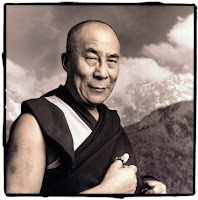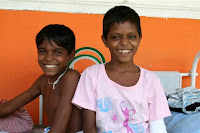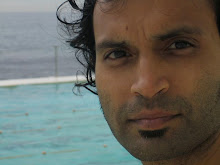 I've been very quiet on my Peace Blog which was meant to be an ongoing account and archive of what peace activities are happening here in Sri Lanka, an ongoing dialog of positive ideas, and a platform to have non-partisan discussion for a better future. Unfortunately I got too bogged down with my academic work.
I've been very quiet on my Peace Blog which was meant to be an ongoing account and archive of what peace activities are happening here in Sri Lanka, an ongoing dialog of positive ideas, and a platform to have non-partisan discussion for a better future. Unfortunately I got too bogged down with my academic work.However, today was a very very sad day for me which really drove home the reality of what it means to be at war. There are a lot of conflicting emotions to deal with. Since Saturday there have been 3 bombs set off by the LTTE that have resulted in the death of 31 people and the injury of more than 150 people.
Saturday 2nd Feb - A public bus going from Kandy to Anuradhapura was blown up in Dambulla, killing 20 and injuring over 50 people (people who were on a pilgrimage).
Sunday 3rd Feb - A grenade thrown into the Dehiwala Zoo injured 4 people
Sunday 3rd Feb - A bomb set off on a train in Fort, Colombo's main railways station killed 11 people and injured over 100 people.
These are all civilian deaths. These are all a result of the LTTE terrorist activities.
In addition to these highlighted deaths there are the deaths that are occurring in the North of this beautiful island everyday, due to a military offensive against the LTTE, and the similar retaliations. Basically it's war up there. There are many casualties occurring, the exact numbers of which are not know.
The casualties included the LTTE fighters and SL army soldiers, but also the inevitable loss of civilians caught in the crossfire. This latter group can be considerable as the LTTE often use human shields or recruit children for fighting which means that these kids are victims to both LTTE conscription, as well victims to the artillery of the SL Army because they are now "the enemy". It's very sad.
WAR = KILLING
KILLING = suffering (for the family and friends of the victims)
What do we all want?
--- PEACE -----
I just wrote that because I feel it is easy to forget these simple logical conclusions and words of truth. The current climate is that "war is a solution", not just here in Sri Lanka, but in the entire world. You don't have to look far to find war, or advocacy of violence being a completely normal way to solve a problem. Why is this I wonder? Do we have no faith in the wisdome of some of these great leaders that existed in the past, and what they stood for? Look what they managed to achieve without resorting to violence.

“Nonviolence is a weapon of the strong”
“The weak can never forgive. Forgiveness is the attribute of the strong.”
“Be the change you want to see in the world.”
“Whenever you have truth it must be given with love, or the message and the messenger will be rejected”
(quotes by Mahatma Gandhi)

"Darkness cannot drive out darkness; only light can do that. Hate cannot drive out hate; only love can do that"
(Martin Luther King, Jr.)
People who advocate war and violence
I wonder what the people who advocate war in Sri Lanka, or in the rest of the world for that matter, really think when they consider the above statements? Whether they be LTTE supporters, or Sri Lankan army supporters - it doesn't matter - do they really believe taking someone's life is going to improve the world they live in, or even their little part of the world?
I also really wonder - would they be so keen for war if it were their own children on the frontline of the battlefield in the north? If you are and advocate of this war - would you want your own kith and kin on the frontline to be fighting it for you? Please think about that question properly before you answer it ?
My answer is a simple. No
And if this is the case, then I think they should stop hostilities and force a seize fire immediately.
Unless I am personally willing to jump to front line of a military offensive - how can I advocate somebody else to send their children to do my dirty work for me? Sound crazy ? Actually it makes sense, but sadly not a mainstream view point.
There's all sorts of much more sensible view points like " you don't understand, that's not how the world works", "you can't trust them, tho only way to be sure is to kill them and elliminate them " etc etc.
Is there any thought for the countless number of family members or friends who will still be left alive with grievances - no this is never thought about in the simple "kill and exterminate" model, because people who use this model operate on the basis of Kill now, and we can deal with those problems later, rather than let's not kill so we don't have to deal with those problems among other problems.
Anyway my feelings are clear to me. We should immediately stop all violence - re-evaluate the mistaken idea that a military solution to a problem is the correct path to take.

People who advocate war and violence (who themselves live outside Sri Lanka)
If you are living outside Sri Lanka and sitting in an armchair watching CNN or BBC or Al Jezeera - and your advocating or supporting this violence - whether you support the LTTE or the Governments of Sri Lanka or any group that promotes killing or violence - then why don't you come here and start catching the public buses which are being blown up in increasing frequency in the current situation.
Or again, answer the question "are you willing to send your own children on the frontline of the battlefield in the north?". (I pose it in this manner because the majority of people who want this violence somehow are poeple who are old enough to have children, and the children seem to follow what lead thier parents take)
I was due to travel through Dambulla tomorrow, past the very place where Saturday's bomb exploded. My cousin caught a bus from colombo fort railway station where the train exploded, but luckily hours before.
I don't want to be caught up in the next bomb.
Is the loss of even one life- too much? There has to be another way.
There is another way, and if we can't see it - well we just have to look harder.

Pro Peace does not equal Pro LTTE
"Being pro peace does not make you Pro LTTE", I am against "any group" that uses force and violence, and Sadly the LTTE is an incredibly violent group.
In addition to killing many innocent civilians, such as on occasions like today, they have also killed many many Tamil politicians and peacemakers alike. If they are really for a the cause of the Tamils of Sri Lanka they would not behave like this. Also if any group is going to justly represent the Tamil people they should be able tolerate debate within the organisation. Sadly in the LTTE there has very little tolerance of any alternative opinion. This fact is often not know by people unfamiliar with Sri Lanka's conflict and often overlooked by LTTE supporters because of their distrust of the Government is so high.
(the interview : http://www.pbs.org/pov/pov2006/nomoretears/special_uthr.html )
This interview with the University Teachers for human rights (Jaffna), and independant Human rights watchdog elucidates this phenomenon well in thier monitoring of LTTE activities over the years, particullarly in the way they killed Dr. Rajani Thiranagama (an LTTE supporter who worked with them and then disagreed with their methods), to send a message that no alternative opinion would be tolerated.

Pro Peace does not equal "Anti-government"
I maintain that it still makes sense to work within the framework of democracy, is supporting the government. However, if the government uses force and violence as their primary means of achieving things, then I cannot support the elements within that want this. I will not limit myself to being "anti-government" as some chose. Being "Anti" anything closes off the door to the opposing side of any argument, and forces one to disengage. In the same way I am not Anit LTTE, despite the killings and past action - I am against those elements who have chosen a violent an inhumane path, or continue to do so.
Whilst the current government is carrying out a military offensive, this doesn't mean that everybody who is within the government agrees with this. The news papers may be black and white, but the minds of many of the people whose ideas get written about are i'm sure a little more to do with "shades of grey". There is plenty of unvoiced opinion in favor of a more peaceful, non violent solution. This is why, a climate of one should be with the government 100%, otherwise you are against them is not the way forward for meaningful dialog and understanding in my opinion.
This is why I hold the government in a position of hope, unlike so many other citizens who are disillusioned by their current military stance. There has to be a way to reach out to the leaders of this country to feel confident that there is another way. If the entire population of Sri Lanka wanted peace by immediate cessation of violence, then the government would have to do this, or atleast it would given them the confidence to do so. Unfortunately this is not the case, but it is just to simple to blame the state without looking at our actions or lack of actions as being party to this tradegy.
I say, even if the current strategy of a "military solution" was carried out, and the LTTE was killed (along with countless civilians - which is what it would amount to). What would be the fall out afterwards - does the advocate of military tactics think of this?
No matter what happens we are going to have to deal with the consequence of so many loved ones having died, but the sooner this happens the less people who have died in an already far too high toll, and thus the better for us all.
Many people who question peace, often say "what is the point always appealing to the government to stop hostilities. Why don't the supporter of LTTE do the same form the LTTE" As mentioned before the very nature of the LTTE organisation is such that it doesn't tolerate descent or core differences opinion. We live in a democracy and we have the power to empower our rights as citizens that this state represents. Whilst people in Sri Lanka do experience problems with freedom of speech, and there are problems, I believe people sing this song far to loud. Since being here I have read many articles about on topics such as "Sinhala Buddhist Chauvinism" where they are publishing articles highly critical of some lines of thinking (which were quite valid opinions) but were published in national newspapers all the same.
When I went on a peace vigil on 31st of December last year (whilst there was an intense military offensive in the north). We had the message of "stop the violence and killing in 2008", and we were treated with respect and dignity by citizens passing by, the local police and military vehicles had passed by without any problem. Whilst mainstream journalism has had issues with freedom of speech, other mediums such as this one (blogging) goes without interference, after all I am expressing my views right now and this is some testament to the country in which I am living. I have read many similar such posting from many Sri Lankan citizens. (Having said this I do know that Tamil. net in blocked in Sri Lanka)
My point that should not be missed is that despite the problems we face here, we do not live in a "dicatorial state", unless we chose to feel that we do. The reality is that democracy of every country is flawed at some level - a recent talk that I went to by the American author, Gore Vidal - illustrated the flaws in US democracy quite nicely.
We can all realise the freedom that we do have and use it to our full potential constructively. We just need to have more constructive diaolog. This is another reason why i set up this blog - so please excercise your rights leave a comment for me and others to read if you so desire.
The real victims - the people who are most important not to forget

The poor people who are innocent victims in this conflict. The families of the people killed in todays bombs. The families of the Soldiers who are also killed . The families of the LTTE who often didn't have any choice but to let their family member join in the fighting, especially in the case of child soldiers. These Tamil civilians in the North who live amongst the LTTE, who are subject to Army and Airoforce attacks on one side, and LTTE forced child conscription on the other side.

These people are all the real victims.


(these are just pictures of regular people I have taken over the last two years, from markets in Wellawatte, Villages in the south, and hospitals in the north central province - with permission. They are not actual victims but represent potential victims - as we all do. Interestingly Tamils, Sinhalese, and Muslims are represented in these three pictures - which is quite fitting because all are victims of this conflict - it affects the entire Sri Lankan population)
Who is responsible for violence?
These are the people instructing the people that fighting is the only way. The heads of the LTTE. Also the heads of state in this government, all the way down to "you" or "I", who have the ability to voice our opinions (unlike the people of the Wanni) but choose not to. We choose not to partly out of fear, but partly because we do not know how to voice our opinions in a effective way (again, why not try leaving a comment)
Why can we not find a better way?
Not tomorrow but today.
How many more deaths do we need to experience?
How close to home does it have to be before we give up the game of violence? Surely the whole world would be a better place if we just gave up violence?
Why do Pro Peace people never protest against LTTE bombings?
I've been asked several times by people who are against Pro Peace movements, saying "you are always jumping up and down whenever the government wants to try an eliminate terrorism in for the safety of the country, but why is it that nobody protests against the LTTE when they set off a bomb?"

I've been looking at my own responses as person who is pro peace -in how I view todays bombs
1) When the LTTE sets off a bomb such as in the Fort Railway station (where the Peace Vigil I took part in on Dec 31st was held) - it really destablises society. Right now I don't feel safe to go the streets. Nor do I think it will be wise to organise a group of people to stand out side fort Railway station with placard saying "LTTE" please stop killing civilians" because the reality is they are now targeting civilians, and a group of people protesting their actions might then be prime targets.
2) I also know that part of the reason the LTTE is targeting civilians is that they are desperate and they are using whatever means are available.
 The reality is that in War there are no rules that people follow, especially in terrorist warfare. We can say "the LTTE really shouldn't target civilians", "this is a cowardly and inhumane act" (which it is). I "am" saying this. However, the reality is this is the LTTE do, whether we like it or not.
The reality is that in War there are no rules that people follow, especially in terrorist warfare. We can say "the LTTE really shouldn't target civilians", "this is a cowardly and inhumane act" (which it is). I "am" saying this. However, the reality is this is the LTTE do, whether we like it or not.Therefore, when the government runs offensive military operations in the North, then given the tactics of the LTTE, they know that we will expect to see such bombing that occurred today in the south. Thus they know that their actions will result in civilian death, and are willing to tolerate it.
More force and aggression doesn't lead to less violence, on the contrary, it leads to more.
Anyone who is Truly for "Peace" is against "all killings" no matter who is responsible. Peace is non partisan (see Thich Nhat Hanh video in previous post). I agree that you can twist this by only calling peace when one type of killing occurs - this is certainly not the case in my experience of actually meeting with people who are for peace.
It scares me that society can sometimes actually be "against" peace
 (I ask the question are these Buddhist monks or Christian priests really interested in overthrowing the government? Am interested in overthrowing the government - not at all. They just want peace. I just want peace. We all just want PEACE.
(I ask the question are these Buddhist monks or Christian priests really interested in overthrowing the government? Am interested in overthrowing the government - not at all. They just want peace. I just want peace. We all just want PEACE.I guess the debate comes in peoples belief of how peace will come about - a "War for peace", or perhaps "Peace for Peace" - which one would you invest your money in? I know which one I would )
KILLING = SUFFERING , it's the simple formula. You don't need a degree to figure this one out.
The ultimate hope is that by showing the way of non-violence a peaceful solution can be achieved.
Time to sleep
Anyway, i'm tired, and I have a long PhD proposal to write, that's way overdue. It's hard to explain to supervisors who are in Australia that some of my lack of progress is about caring about the world that I living too much to just "get on with it". Also the belief that I can make a difference, no matter how small it may be, with positive ideas, also seems to hamper progress on the work front - nevertheless I am happy with my choices.
Happy 60th Independance Sri Lanka - let's make it worth something, I know we can, despite the odds.
Here's hoping that Sri Lanka moves toward the amazing country that it could be - one that respects unity in diversity, peace and understanding. I believe it can be, and when we think, talk and discuss, we are making positive steps in the right direction. To work with these "shades of grey" rather than to choose either "black or white" is the challenge that awaits us and could help us create the rainbow of our future.

Tonight please spare a thought for all the innocent victims of this senseless violence.
( I really mean "senseless" - violence never make sense when you really look at it - if you can give me a logical reason why violence does make sense please let me know)
Finally I would like to post the Dalai Lama's recent words on a his vision of a Compassionate Future (next post)
May all you all being be well, and truly find peace in this lifetime
B :)
Please read the Dalai Lama's message - it is beautiful piece of work and truely inspirational - i've copied the section that I think is relevant to my current discussion below
"But the genuine practice of nonviolence is still at an experimental stage. If this experiment succeeds, it can open the way to a far more peaceful world. We need to embrace a more realistic approach to dealing with human conflicts, an approach that is in tune with a new reality of heavy interdependence in which the old concepts of "we" and "they" are no longer relevant. The very idea of total victory for one's own side and the total defeat of one's enemy is untenable. In violent conflicts, the innocent are often the first casualties, as the war in Iraq and Sudan's Darfur crisis [ed note - "or the Sri Lankan conflict"] painfully remind us. Today, the only viable solution to human conflicts will come through dialogue and reconciliation based on the spirit of compromise."
My dream is that we have an end to human conflict. This dream is achievable if enough people believe it.
Standing fo peace is "not" Crazy.
B :)


